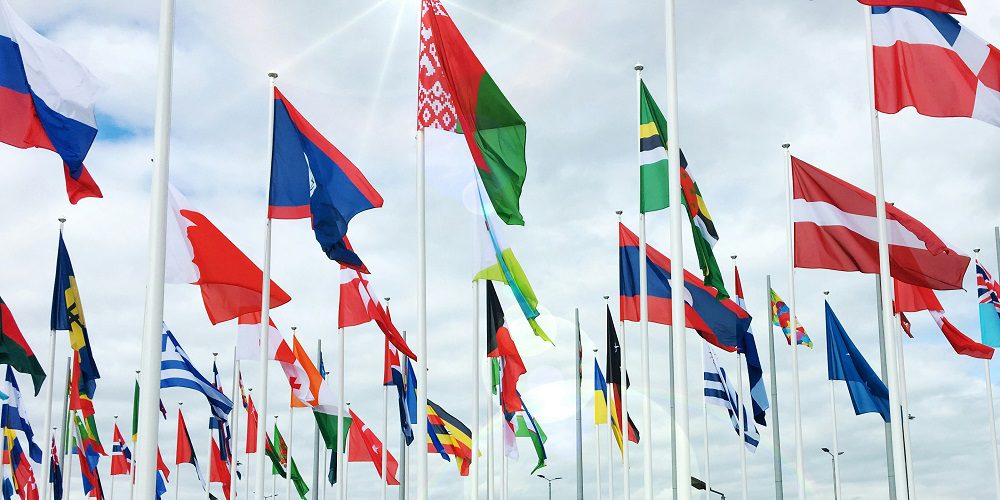Are you tired of waiting for webpages to load at a snail’s pace or dealing with frustratingly slow download speeds? Well, get ready to rev up your internet experience as we dive into the world of countries with lightning-fast internet connections! In this blog post, we will explore the need for speed and take you on an exhilarating journey through nations that have mastered the art of high-speed internet. From streaming movies in seconds to seamless video calls across continents,
Introduction:
In today’s fast-paced and digital world, internet connectivity has become an essential part of our daily lives. From work to education, entertainment to communication, almost every aspect of our lives is heavily reliant on a stable and high-speed internet connection.
The demand for fast internet connections has only increased over the years with the rise of new technologies and online services. Businesses require lightning-fast speeds for their operations, students need it for online learning, and individuals rely on it for staying connected with friends and family across the globe.
However, not all countries are created equal when it comes to internet connectivity. The speed and quality vary greatly from one country to another, which can have significant implications on its citizens’ productivity, economic growth, and overall development.
The Top Countries with Fast Internet Connections:
When it comes to internet speed, not all countries are created equal. Some have been able to develop and implement advanced technologies that allow for lightning-fast connections, while others still struggle with slow and unreliable internet access.
In this section, we will explore the top countries with the fastest internet connections based on data from the Speed test Global Index. This index ranks countries based on their average fixed broadband and mobile internet speeds.
1. Singapore
Singapore takes the top spot as the country with the world’s fastest average fixed broadband speed at 250.19 Mbps. This can be attributed to its small size, high population density, and heavy investments in fiber-optic infrastructure by its government. Singapore also has a highly competitive telecommunications market, with multiple providers offering high-speed plans at affordable prices.
2. Hong Kong
With an average fixed broadband speed of 228.86 Mbps, Hong Kong comes in second on the list of countries with fast internet connections. Like Singapore, Hong Kong also has a highly developed telecommunications market and strong government support for infrastructure development.
3. Romania
Romania is another surprising entry on this list, with an average fixed broadband speed of 214 Mbps. The country has made significant strides in improving its internet infrastructure over the years, resulting in widespread access to high-speed fiber-optic networks at relatively low costs.
4. South Korea
Known as one of the most technologically advanced countries in the world, it’s no surprise that South Korea ranks fourth on our list with an average fixed broadband speed of 208.45 Mbps. The country has a highly competitive telecommunications market, and the government has invested heavily in fiber-optic infrastructure.
5. Switzerland
Switzerland may be a small country, but it boasts an impressive average fixed broadband speed of 180.19 Mbps, earning it fifth place on the list. Swiss internet users benefit from a combination of advanced technology and strong regulatory policies that ensure high-quality internet services.
6. Norway
Norway comes in sixth on our list with an average fixed broadband speed of 174 Mbps. The country has a highly developed economy and has made significant investments in its internet infrastructure, resulting in widespread access to high-speed networks.
7. Sweden
With an average fixed broadband speed of 158.49 Mbps, Sweden is another Scandinavian country that ranks high on the list of countries with fast internet connections. Sweden has invested heavily in fiber-optic networks and also has a competitive telecommunications market.
8. Denmark
Denmark ranks eighth on our list with an average fixed broadband speed of 157.44 Mbps. The country’s small size and dense population make it easier to provide high-speed internet access to its citizens, and government initiatives have also helped improve its overall connectivity.
Factors That Contribute to Fast Internet Speeds:
When it comes to internet speeds, some countries stand out above the rest. These countries have managed to achieve lightning-fast internet connections that allow their citizens and businesses to access information, communicate, and conduct transactions at an unprecedented pace. But what factors contribute to these fast internet speeds? Let’s take a closer look.
1. Technological Advancements:
One of the main factors contributing to fast internet speeds is technological advancement. As technology continues to evolve, so does the infrastructure that supports internet connectivity. Countries with advanced telecommunication systems and fiber-optic networks tend to have faster internet speeds compared to those with older technology.
2. Government Investments:
Governments play a crucial role in ensuring fast internet speeds for their citizens. In many cases, governments invest in telecommunications companies or provide subsidies for them to upgrade their infrastructure and improve network coverage. This investment helps ensure that citizens have access to high-speed internet connections.
3. Network Quality:
The quality of the network also plays a significant role in determining internet speed. Factors such as latency, packet loss, and jitter can affect how quickly data travels from one point to another on the network. Countries with well-maintained and upgraded networks will typically have faster internet speeds compared to those with outdated or poorly maintained networks.
4. Internet Service Providers (ISPs):
The ISPs operating within a country also play a critical role in providing fast internet connections. These companies are responsible for building and maintaining the physical infrastructure needed for accessing the internet, such as cables and servers. Countries with a competitive market for ISPs tend to have faster internet speeds as these companies work to outdo each other in terms of speed and quality of service.
5. Government Regulations:
Government regulations can also impact internet speeds. In some countries, strict regulations and bureaucratic processes can slow down the process of upgrading or expanding telecommunication networks. On the other hand, countries with more relaxed regulations tend to have faster internet speeds as companies can quickly implement new technologies and infrastructure upgrades.
6. Population Density:
Population density can also affect internet speeds in a country. In densely populated areas, there may be more demand for internet services, leading to slower speeds due to network congestion. On the other hand, less densely populated areas may have faster internet speeds due to fewer users placing demands on the network.
7. Geography:
The physical geography of a country can also play a role in determining internet speeds. Countries with mountainous terrain or many remote islands may face challenges in establishing and maintaining fast internet connections due to the difficult terrain and high costs involved in laying cables and building infrastructure.
8. Internet Exchange Points (IXPs):
Internet Exchange Points (IXPs) are physical locations where different ISPs connect their networks to exchange traffic directly instead of routing it through third-party networks.
Benefits of Living in a Country with Fast Internet:
Living in a country with fast internet has numerous benefits that can greatly enhance the quality of life for its residents. In this modern age, where technology plays an integral role in every aspect of our lives, having access to lightning-fast internet is no longer just a luxury but a necessity.
1. Increased Productivity
One of the most significant advantages of living in a country with fast internet access is increased productivity. With high-speed connections, individuals can complete tasks and projects efficiently, saving time and effort. This is especially beneficial for professionals who rely heavily on internet-based tools and communication platforms to carry out their work.
2. Seamless Communication
Fast internet connections also enable seamless communication, both locally and internationally. Whether it’s through video calls, messaging apps, or emails, people can easily connect and stay in touch with loved ones, colleagues, or business partners without any interruptions or delays caused by slow loading times.
3. Access to Global Information
With fast internet speeds, residents have access to a wealth of information from all over the world at their fingertips. This allows them to stay updated on current events, trends, and advancements in various fields, such as education, healthcare, and technology.
4. Better education opportunities
In countries with fast internet connections, students have better access to online learning materials, which can greatly enhance their educational experience. They can also take advantage of e-learning programs offered by renowned institutions around the world without having to leave their home country.
5. Enhanced Entertainment Options
High-speed internet opens up endless entertainment possibilities for residents. With fast connections, individuals can stream high-quality video content, play online games without lags, and enjoy various forms of digital entertainment without any interruptions.
6. Efficient Government Services
In countries with fast internet speeds, government services can be delivered to citizens more efficiently. This includes e-government services such as online tax filing, bill payments, and access to government databases, which reduces the need for physical paperwork and long wait times.
7. Improved Healthcare
Fast internet connections also have a positive impact on healthcare services. Doctors can remotely monitor patients’ health conditions and provide consultations through telemedicine platforms, reducing the need for in-person visits. This is especially beneficial for individuals living in rural areas with limited access to healthcare facilities.
8. Boost to the Economy
Having fast internet connections can attract foreign investment and businesses to a country, boosting its economy. It also allows local businesses to expand their reach globally by tapping into e-commerce platforms and reaching a wider customer base.
Conclusion
Living in a country with fast internet has numerous benefits that can greatly improve the quality of life for its residents. From increased productivity and seamless communication to better education opportunities and improved healthcare services, fast internet connections are essential for the development and progress of individuals and society as a whole.



































